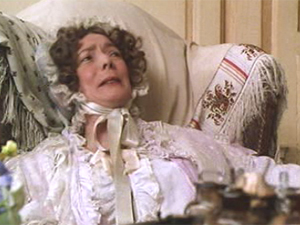
When I first read Pride and Prejudice by Jane Austen, I was closer to Jane Bennet's age and did think Mrs. Bennet a somewhat ridiculous creature. Now close to Mrs, Bennet's age, I understand her. Women of our age go through drastic changes physically, mentally and emotionally. For instance the past few months, I have been experiencing some severe symptoms of perimenopause: nightly hot flushes, adrenaline surges, full-blown panic attacks (several per night and day,) muscle aches and stiff joints, abdominal pains, bloating, tender breasts, and more.
Two nights ago, stretched out upon my bed in the wee hours of the morning, unable to sleep, the attacks were horribly bad-- heart palpitations, flutters, muscle spasms, anxiety, and uncontrollable shaking-- aware of every little pain, twitch and tingle. After much prayer, reading of the Psalms and listening to relaxing music, the Lord blessed me with a thought to put my troubles in perspective and give me at least some mental relief. I suddenly recalled the scene with Mrs. Bennet after Lydia ran away with Mr. Wickham where she lay in her bed, crying and complaining to Jane, Elizabeth, Mary and Kitty of her ailments and the distress caused by the actions of her "baby" Lydia, which she blamed upon the neglect of the Forsters.

In the midst of my self-pity, I had to laugh!
Poor Mrs. Bennet was going through the change of life! She wasn't making up her complaints. They were very real. Throughout the pages of Pride and Prejudice her anxious nature and her obsessive behaviors are documented. Though Mr. Bennet and her daughter Elizabeth considered her silly and shallow, her other daughters were respectful of her, I would dare say they understood her. After all, her concern was for them, with a bit of self-preservation mixed in with her motives
In that era and society, to become poor was a terrifying prospect, but to be a poor widow woman was the worst of nightmares! In her mind, she had made a good match for herself, marrying a gentleman with an estate above modest, but fate and the laws of the land that entailed the estate to the closest male heir robbed her and her daughters of their security, the security of a good dowry for the girls and the assurance of comfort in her golden years.
Such stress could easily throw her into a series of sleepless nights and fitful days, hot flashes and panic attacks. All of which are very real physical, painful and frightening reactions to bear that can go on for days, weeks, months--even years! Jane had compassion for her mother; Mary, patience, and Kitty, patient support. Yet Mr. Bennet could not understand--he was a man, after all. And Elizabeth could not understand, being young and independent, favoring her father, until she--too--was faced with the reality of an impoverished life and saw the misery that her mother suffered as a result of the anxiety.
How many of today's women around her time of life could cope with the disappointment of a wayward child; the loss of her dreams and hopes for a secure future and the futures of her other children; as well as anxiety attacks, pains, spasms and palpitations without Xanax, Valium, hormone replacement therapy, and psychiatric or psychological therapy? Without these, Mrs. Bennet had to cope. Give the woman a break!
Lori Vidak
4-16-16